C.A. Gray's Blog
September 5, 2025
How to Have That Difficult Conversation, Henry Cloud
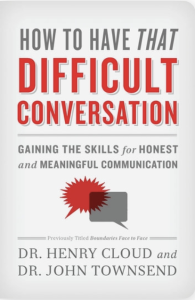
A terrific practical field guide companion to “Boundaries,” this book goes into great detail on the various types of difficult conversations we might encounter when attempting to set boundaries. These range from what the other person might say in response (and how to stand your ground without getting sucked into the weeds), to the types of relationships that might require confrontation, and how that might change the approach. Another great read!
My rating: *****
Language: none
Sexual content: none
Violence: none
Political content: none
The post How to Have That Difficult Conversation, Henry Cloud appeared first on C.A. Gray.
August 28, 2025
Thinking in Systems, Donella Meadows

I didn’t know there was such a thing as systems theory, but this is exactly how I think – about all the feedback systems involved in regulating the body, and the earth’s ecosystem, and the economy, and the climate… Why history unfolded the way that it did (all the factors had to be just so–and if they’d been a bit different, it all might have turned out very differently.) I don’t know that I learned anything precisely brand new, but I did gain a new vocabulary to explain the same process playing out in so many different areas. What makes a system is interconnected feedback loops. This is precisely why sledgehammer interventions directly opposing a problem have unintended and often catastrophic long-term consequences, no matter what the system is. An easy and thought-provoking listen!
My rating: *****
Language: none
Sexual content: none
Violence: none
Political content: none
The post Thinking in Systems, Donella Meadows appeared first on C.A. Gray.
August 22, 2025
Jamaica Inn, Daphne du Maurier
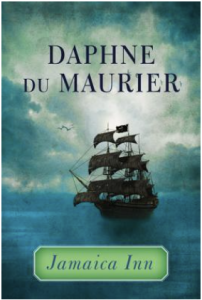
My husband and I read this one aloud to one another–ironically, we discovered it on the shelf of a hotel we were staying at in Jamaica, called Jamaica Inn, though this book is set in England. (I never was entirely clear on why the eponymous inn was called that in the book.) This is the second book I’ve read by du Maurier — the first of course was “Rebecca,” which was wonderful. This was also very good, but the pacing was incredibly slow. Somehow I don’t mind that when reading anything by du Maurier though, because her prose is so gorgeous and atmospheric. Very little needs to happen, and yet I’m still wrapped up in the story.
I can’t now recall the exact date of the story’s setting, but it was about a century or more ago, perhaps in the Victorian era English countryside. Mary’s mother recently died, and to care for her, her mother told her she must go to her aunt, who has married the owner of Jamaica Inn. Mary remembers her aunt Patience as a vivacious and lovely woman, but she finds her a shell of a creature, cowering under the tyranny of her drunken and (apparently) abusive husband, Joss Merlyn. A good half the book or more is just Mary figuring out the exact nature of Joss’s villainy. It turns out that he runs a smuggling operation, but he’s not above murder to get his hands on his wares, either. Mary would just run away, if not for her concern for her aunt, whom she know isn’t strong enough to flee with her or stand up to Joss in any way.
Meanwhile, Joss has a brother, Jem, who’s basically also a scoundrel to a lesser degree. Mary strangely falls in love with him. Then there’s the albino vicar with whom she has a chance meeting, and she begins to form a plan that the vicar will eventually be her ticket out… or will he?
This is the sort of book to read on a wild and stormy night.
My rating: ****
Language: none
Violence: present but not gratuitous
Sexual content: none
Political content: none
The post Jamaica Inn, Daphne du Maurier appeared first on C.A. Gray.
August 15, 2025
Shift, Ethan Kross
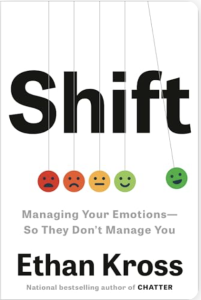
This is a terrific overview of techniques we can employ consciously in order to manage our own emotions. It also gives I think a much-needed counterbalance to the idea that all repression is bad, and therefore we should never avoid our emotions, by exploring well-adjusted individuals who had suffered severe trauma, and who selectively processed, as the author describes, according to the people they were with and the situation.
I think the author mentions somewhere in there that this should be taught in schools. Absolutely!!
My rating: *****
Language: none
Sexual content: none
Violence: none
Political content: none
The post Shift, Ethan Kross appeared first on C.A. Gray.
August 7, 2025
Seeing the Supernatural, Lee Strobel

I heard a guest sermon from Strobel in which he discussed this book, and picked it up, curious to see how an investigative journalist would be able to especially parse through various near-death experience tales with an objective eye. I’ve always been kind of confused by anecdotal tales I’ve heard second or third-hand that seemed to contradict what I think the Bible teaches.
Strobel did a great job dealing with these, once I got to that section; I hadn’t realized that so much objective research had actually already gone into this. He also discusses both what scripture says about ghosts, and treats the spiritualist movement and its modern iterations with a similarly objective eye, which I likewise found refreshing.
My rating: ****
Language: none
Violence: none
Sexual content: none
Political content: none
The post Seeing the Supernatural, Lee Strobel appeared first on C.A. Gray.
August 1, 2025
The Frugal Wizard’s Handbook for Surviving Medieval England, Brandon Sanderson
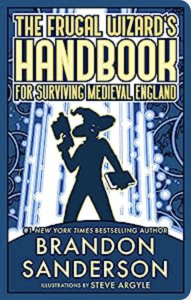
I listened to the audio version of this with a full cast. The concept and the framing was the best part, by far: in the multiverse, a company gets the rights to “sell” a particular universe to an individual wizard, where they can go in and change history in whatever way they please. Since they’re also time-traveling, they can, god-like, cure diseases, or introduce technology, become king, etc. Periodically the story was interrupted by commentary from “the handbook,” describing the rules of the company and what is and isn’t possible–which was hilarious.
The story itself opens with the amnesia trope, though that too was very uniquely done — the traveler doesn’t recall who he is, or where he is, which is part of why the commentary from the handbook is so helpful. As he interacts in the world, and sees what his own instincts are, he learns who he is, and why he’s there. I actually found all the details who the bad guys were in this world, what they want, and why it’s important to stop them far less interesting than the handbook commentary itself, though the commentary kind of did require a story as a vehicle.
My rating: ***
Language: I think there was some? Can’t recall
Sexual content: none
Violence: some, but not over the top
Political content: none
The post The Frugal Wizard’s Handbook for Surviving Medieval England, Brandon Sanderson appeared first on C.A. Gray.
July 25, 2025
Uprooted, Naomi Novik
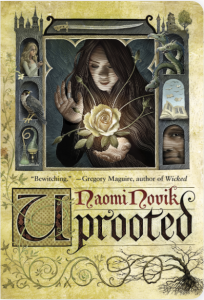
This is one of the best fantasies I’ve read in a long time! I even read the kindle version (rather than audio), which for me raises the bar considerably in terms of what it takes to hold my interest. This one did, even though I felt there were a few caveats that kept it from being an all time favorite, or one I’d likely reread.
The story follows Agnieszka, a tomboyish young girl in a village abutting a sinister forest. Hers is one of several villages in the valley, all overseen by a wizard in a tower who goes by the name of the Dragon. Every 10 years, he takes one of the girls of a certain age, and then ten years later releases her again before choosing another. No one exactly knows what he wants them for, or what he does with them, nor do the girls themselves ever precisely say once released — but they leave the valley once they are released, and seek their fortunes elsewhere. The girls chosen are always special, beautiful or talented or otherwise desirable in some way, so Agnieszka is certain he will take her best friend Kasia. But instead, he chooses her.
It turns out that the Dragon (whom we later learn is named Sarkan) is no ogre after all, but merely a prickly man who has been alone for well over a century (neither witches nor wizards age in this world). He’s sharp-tongued, sarcastic, and used to having things “just so,” while Agnieszka is clumsy and perpetually filthy. He chose her, it turns out, because her perceived the threads of magic in her. He felt it his duty to train her, though he considers her hopeless until she learns on her own that her magic is simply of a different sort than his. Once she comes into her own, an unlikely and very well done romance blossoms (and here is caveat #1. Why is it that the second tension gives way to a kiss, the very next step in all modern fiction is sex? It’s almost like the author feels the need for a very good excuse indeed to *not* go there. And in this one, while there are only two sex scenes in the book, they’re not fade-to-black; they give you all the details.)
Meanwhile, the Wood is itself basically the antagonist; it periodically steals villagers and they’re either never seen again, or if they ever do come out, they are no longer themselves, but agents for the Wood. This is why they need a wizard to guard them in the first place, and why the villagers put up with one of their young girls to be taken every 10 years. When Agnieszka’s village is threatened, and then Kasia is taken, she defies the Dragon, and later teams up with him, in order to use her unorthodox magic to help finally set her village free.
And this is caveat #2: Agnieszka’s unorthodox magic is so esoteric that toward the end of the book, it was described in so many layers of metaphor that I couldn’t even follow what was going on. I sped through the paragraphs until I could get to something concrete. I even was under the impression at one point that a major character died, when in fact, she hadn’t.
Despite the caveats, the plot was original, the characters compelling, the prose beautiful, and the ending satisfying.
My rating: ****1/2
Language: none
Violence: pretty intense
Sexual content: sparse, but very graphic when it occurs
Political content: none
The post Uprooted, Naomi Novik appeared first on C.A. Gray.
July 18, 2025
Sacred Rest, Dr Saundra Dalton-Smith

This is the second of the author’s books I’ve read–rather to my surprise, actually. I thought I would already know everything the book had to say from the title alone. And I can’t say that there were any huge surprises, but I found reading it to be a breath of fresh air anyway. Her prose is lovely, but maybe this is more because I can identify with the author, as a doctor, a Christian, and a “type A” personality. I too like to get things done and struggles sometimes to slow down, even though I know I need to. As a naturopathic doctor, I am sure I have a LOT more built-in balance than an internist, as she was, but it all serves as good reminders.
The parts of the book that I feel I really learned from were the way that she differentiates different types of rest. It’s a useful distinction–true rest involves not producing anything, whereas creative rest involves producing something in a hobby one enjoys. I often conflate the two, and then wonder why creative rest doesn’t necessarily feel restorative.
My rating: *****
Language: none
Violence: none
Sexual content: none
Political content: none
The post Sacred Rest, Dr Saundra Dalton-Smith appeared first on C.A. Gray.
July 11, 2025
Improbable, Rysa Walker
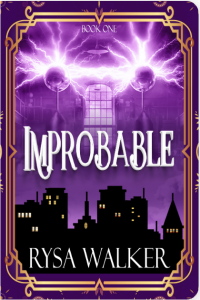
I picked this one up because I was such a huge fan of the “Timebound” series. I can definitely tell this is written by the same author, as it takes place at the turn of the century, when some of the action in the previous series also occurred–and it even includes some historical figures as characters, including (prominently) Mark Twain, and (tangentially) Nikola Tesla. Jack the Ripper isn’t a character, but he’s contemporary so his murders are mentioned several times as a distraction from, and at times a confounding complication of, the plot. There’s also a great deal of focus upon spiritualism, but from a skeptic’s point of view. Honestly, it was the backdrop of the story that intrigued me far more than the story itself… I found myself wanting to read Mark Twain’s work (especially the Prince and the Pauper, which he’d just published at the time of the story… I haven’t cared for his other works, but I started that one and so far I like it a lot more). I wanted to watch documentaries on Tesla, and I started to listen to a podcast series on spiritualism too, though most of them are reverent to believers, which I find off-putting and slightly creepy as a Christian. I found a series of lectures from Ivy league professors on the subject who treat spiritualism more clinically, and I’m giving those a try instead. Same issue with Jack the Ripper–as historical context, that’s utterly fascinating, though I certainly don’t care to delve deeply into serial killer lore.
The story itself starts off rather formulaic–Miriam works at her aunt’s newspaper, whose sister Gwen vanished from an all girls’ school many years earlier, finds Gwen’s diary as well as a pendant that belonged to her. In the diary, she finds that Gwen prophesied that Miriam would one day find the pendant (which serves as a kind of McGuffin in the story–the object that makes everything else possible) and the diary. This, combined with the fact that Mark Twain’s (Samuel Clemens’s) daughter vanishes too leads Miriam down the rabbit trail of what happened to both girls, and many more from that same school besides.
The part about the story itself that I liked most was the introduction of parallel universes down the line–also quite reminiscent of “Timebound,” and another concept that in and of itself intrigues me, especially in the way that the author describes it. I did find modern political sensibilities sprinkled into an historical story rather annoying and anachronistic, though. Really? Do we *always* have to check all the boxes?
I finished this and the second book in the series, but I realized that I’m hardly paying attention to the plot at all as I listen to the third, and I’m *only* listening for the historical context. So I think I’ll probably stop there.
My rating: ****
Language: I think some? Not a lot
Sexual content: none that I recall
Violence: not egregious
Political content: not egregious either, but annoying, since it feels like it was shoe-horned in there for virtue signaling purposes
The post Improbable, Rysa Walker appeared first on C.A. Gray.
July 4, 2025
The Infinite Game, Simon Sinek
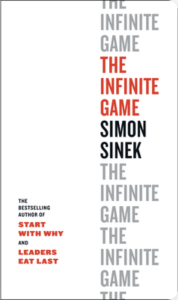
I knew Simon Sinek’s name but not who he was, until I heard a YouTube video where he spoke about AI, and what will distinguish humans in the coming work culture. He was so articulate and compelling that I looked him up, found this book, and bought it.
The premise is that our culture is largely focused upon discrete accomplishments, looking to check boxes, and to “win the game,” whatever the game may be–hence the title. But winning inherently implies that the game is finite, and at the end of a determined period of time, whoever is ahead will win the game. The infinite game, by contrast, has no beginning or end. It’s not inherently zero-sum, where if one person has all the chips, then everybody else has none. It’s the concept that “life is about the journey, not the destination.” This book applies that concept primarily to business, and argues that businesses that are playing the infinite game not only end up doing better in business over the long haul, but they also attract loyal customers and employees, because their goal is in some capacity to make the world a better place–not just to make more money. It’s the most interesting way to reframe the concept of integrity, and purpose, that I think I’ve ever heard.
It’s also a great life reframe, and a good reminder for high achievers everywhere. At the end of our lives, the goals that we all believe matter most have no “end point,” no moment where we can check that box and say we’ve achieved being a good friend, good spouse, good child, good parent, and now we can move on to something else. It’s an infinite game.
My rating: *****
Language: none
Sexual content: none
Violence: none
Political content: none
The post The Infinite Game, Simon Sinek appeared first on C.A. Gray.



